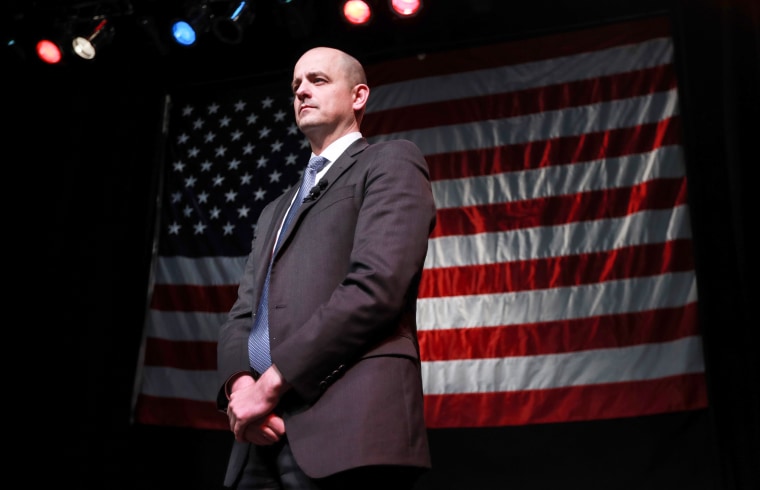Utah independent Senate hopeful Evan McMullin emphasized his push to remain untethered to either party in a new interview, insisting he wouldn't caucus with Republicans or Democrats if he wins and raising concerns about two of former President Donald Trump's picks to the Supreme Court.
McMullin is running against Republican Sen. Mike Lee in the heavily Republican state. Utah Democrats chose to back the independent instead of fielding a candidate of their own. It's because of that unique dynamic that McMullin says he won't caucus with one party over the other if he joins the Senate.
"I need to maintain my independence in order to represent this coalition I'm building — I've asked the Democrats to join me, I've asked Romney Republicans to join me, independents, the United Utah Party, and they are, they're joining this coalition," McMullin said on a new episode of The Chuck ToddCast.
McMullin added he sees himself, if he wins, as joining a "coalition with other pro-Democracy senators." Calling "many Democrats, if not all Democrats" in the Senate "committed to American democracy," he went on to name-check Republican Sens. Mitt Romney of Utah, Susan Collins of Maine, Alaska's Lisa Murkowski and Ben Sasse from Nebraska, as others who share that commitment.
"There also are those in the Senate who, I think, are dangerously extreme, Sen. Lee is one of them, and others who have contributed to a weakening of this institution of Congress, and the Senate and of our democracy."
Also in the interview, McMullin echoed some Democratic frustrations about filibuster reform, saying he doesn't want to abolish it outright but supports a "talking filibuster" and musing about the possibility of lowering the number of votes needed to end debate on legislation from 60 to 55.
And while he said he would have voted to confirm Supreme Court Justices Neil Gorsuch and Ketanji Brown Jackson, nominated by Presidents Donald Trump and Joe Biden respectively, he said he "had concerns" about Justice Brett Kavanaugh and Amy Coney Barrett, Trump's two other Supreme Court picks.
"Brett Kavanaugh seemed to be more of a political operative than a judge, and that concerned me greatly," he said. He added his concerns about Coney Barrett were "similar" and about her "partisan loyalty and lack of impartiality and qualifications."
Asked about the issue of abortion, McMullin warned that the recent Supreme Court decision striking down federal abortion protection could "result in a public health crisis" because of the rise of "extremist laws" passed in GOP-controlled states.
But he stopped far short of echoing the Democratic calls to codify abortion rights into the Constitution.
"We can find a more productive way forward on this issue. Data are very clear that what lowers abortion rates in America is doing more to support women, children and families, making contraception more available, doing more to support women in very difficult situations," McMullin said.
"We need to protect life, we need to have a more comprehensive view of what that means. In my view, it means protecting women, it means protecting children and it does mean protecting the lives of the unborn."

